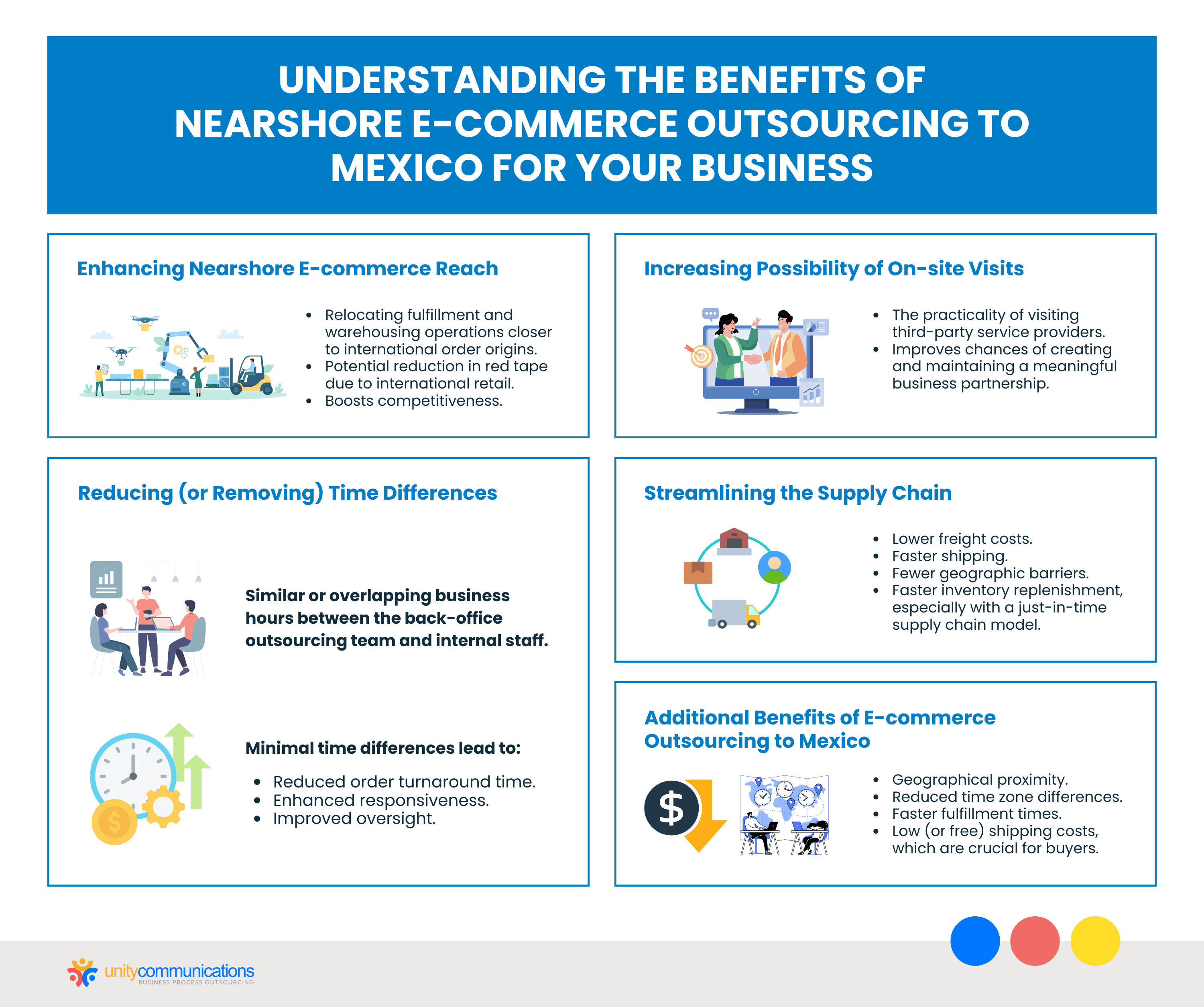Table of Contents
Delegating e-commerce operations overseas is traditionally a good strategy for merchants who want to reduce costs. However, the status of supply chains and logistics has forced retailers to reconsider the efficiency and reliability of their outsourcing methods.
The disruptions to manufacturing, supply chain, and distribution cut down on the value of offshore outsourcing. Outsourcing will stay, but e-commerce brands are considering nearshore options to boost efficiency and reliability. For example, they might outsource non-core e-commerce functions to virtual assistants in Mexico.
This article explores how nearshoring in Mexico for e-commerce outsourcing can elevate your business.
How Nearshore E-commerce Outsourcing Can Elevate Your Business

Before we start, what is business process outsourcing (BPO)? It subcontracts certain operations to service providers who can perform the functions cost-effectively. Nearshore outsourcing is a type of BPO where companies outsource to nearby vendors. Mexico is a prominent destination for nearshore outsourcing for U.S. companies.
Many of the globe’s most popular outsourcing locations are half a world away from your stateside e-commerce headquarters. However, offshore outsourcing creates inevitable problems, including oversight, time zone differences, and shipping delays.
Nearshoring means partnering with outsourcing firms in neighboring countries, such as when U.S. merchants outsource to Mexico. While this country might not seem the most cost-effective option on paper, the value of nearshore outsourcing is often greater than that of offshore, considering all its benefits.
Here are a few ways nearshore outsourcing advantages in e-commerce to Mexico can elevate your business:
- Enhancing nearshore e-commerce reach. Brands planning to expand into Mexican customer bases can greatly benefit from nearshoring. Outsourcing means relocating fulfillment and warehousing operations closer to where international orders originate. It potentially reduces red tape due to international retail and boosts competitiveness.
- Reducing (or removing) time differences. Nearshore outsourcing enhances collaboration between your back-office outsourcing team and internal staff because they have similar or overlapping business hours. Minimal time differences help reduce the order turnaround time, enhance responsiveness, and improve oversight.
- Increasing the possibility of on-site visits. You might need to visit your third-party service provider every once in a while. Nearshore e-commerce outsourcing to Mexico makes this more practical and improves your chances of creating and maintaining a meaningful business partnership.
- Streamlining the supply chain with lower freight costs and faster shipping. The nearer your goods are to where you need them, the better. This means fewer geographic barriers between you and your supplies and faster inventory replenishment, especially if you operate on a just-in-time supply chain model.
E-commerce outsourcing to Mexico has many benefits, from geographical proximity to reduced time zone differences. Moreover, faster fulfillment times and low (or free) shipping costs are high on the list of things buyers look for when purchasing online. The closer your fulfillment and warehousing operations are to shoppers’ front doors, the better your shipping deals.
Which Areas of Your E-commerce Business Can You Outsource to Mexico?
Inventory management, customer service, tech support, and data entry services are examples of functions you can outsource to virtual assistants in Mexico.
The e-commerce market experienced ten years of growth in three months in 2020. At the time, retailers worldwide were forced to close physical stores, and most customers turned to online shopping. According to an Adobe report, total online spending as of May 2020 hit $82.5 billion, up 77% year-over-year thanks to the accelerated growth.
E-commerce has reached an all-time high and will only continue to grow. Because of its rapidly changing nature, e-commerce is one of the hardest markets to enter. However, with the help of nearshore e-commerce outsourcing, you can elevate your business promptly, effectively, and cost-efficiently. Here are some e-commerce functions you can outsource to Mexico:
- IT infrastructure. IT is a specialized field that is constantly changing. An e-commerce business needs hosting solutions, backups, website development, design, and maintenance. Outsourcing this function to a service provider makes sense unless you have dedicated in-house resources. Plus, Mexico is abundant with IT experts.
- Fulfillment. Fulfillment involves many aspects, including new stock receipt, inventory management, order processing, packing, and shipping. How much of this you can keep in-house depends on your logistical experience and resources. Outsourcing is beneficial when considering indirect costs, such as storage space rental and packing teams.
- Product information management services. A successful e-commerce brand requires regularly updated product information. They must create product images, write creative descriptions, and manage stock statuses to achieve this. Outsourcing to virtual assistants or a bulk product data entry solution is a great job.
- Order processing. This involves the placement, tracking, and validation of orders. It also deals with changes, cancellations, and refunds. You likely do not have many orders when you start, so a virtual assistant can help you handle this process initially. Hiring a dedicated nearshore e-commerce outsourcing team makes sense as you grow.
- Social media management. A dedicated social media management team will help showcase your products and expand your reach. They can also maximize your social media presence and enhance engagement across different platforms.
- Advertising (PPC). A pay-per-click and digital advertising specialist will oversee your digital marketing strategies—from managing ad spending to increasing the goal conversation rates and generating higher sales.
- Content marketing. Outsourcing content creation is best if you do not have the time to do it in-house. Researching, writing, and publishing content for blog posts is a full-time job. Nearshore outsourcing firms provide content creation experts, freeing you to concentrate on other e-commerce aspects.
- Tech support and customer service. Customer service is key to customer satisfaction; leveraging industry specialists helps you do it well. Nearshore e-commerce outsourcing takes routine issues and order inquiries off your hands. Consider which channels you want to outsource, then utilize the contact center as a service (CCaaS).
Nearshore E-commerce Outsourcing Best Practices for Top-notch Service
The global e-commerce market will continue to experience massive growth. Case in point:
- Online sales will make up 22% of worldwide retail revenue in 2023.
- E-commerce sales will reach over $740 billion in 2023 in the United States alone.
- Ninety-five percent of worldwide purchases will be done online by 2040.
E-commerce demand will only continue to rise; however, many industry giants are already decades ahead of you. The good news is that customer experience levels the playing field regardless of how competitive e-commerce is. Most buyers choose a brand based on the quality of their customer service.
Hence, improving your e-commerce customer support is a great strategy to compete with the giants of the online shopping industry. Leverage nearshore e-commerce outsourcing and review nearshore outsourcing examples if you are clueless about where or how to begin.
Design Attainable and Measurable E-commerce Customer Service Metrics
You cannot improve something that you cannot measure. Using actionable key performance indicators (KPIs) and metrics helps you plan data-driven strategies that meet business objectives and boost revenue. Without them, you might make uninformed business decisions that will harm operations.
You do not need a KPI for all areas of operations. Simply identify the business areas that impact your goals and concentrate on monitoring and improving those KPIs. You can seek the help of an e-commerce outsourcing vendor that uses KPI implementation in its approach.
Here are common KPIs for e-commerce:
- Customer lifetime value (CLV). CLV refers to the total money a client spends on your brand. Retaining customers is cheaper than attracting new ones, so measuring your CLV is important.
- Conversion rate. This rate refers to the number of leads who convert and become paying customers for your business. Knowing this rate helps you design optimization strategies.
- Net promoter score (NPS). NPS tells you how likely a client is to recommend your brand to another based on their experience with your business. Understanding how happy or unhappy buyers are with your e-commerce store is the initial step to addressing pain points in the customer journey.
Use a Robust Customer Relationship Management (CRM) Platform
A CRM platform allows businesses to build better relationships with their shoppers. It gives your marketing and customer care teams visibility into client information. Plus, it automates repetitive workflows that annoy agents and buyers.
CRM offers your brand invaluable insights—from basic client details, such as name and contact information, to purchasing behavior and history. It also allows you to design a seamless, personalized client experience that drives acquisition and retention.
Despite the benefits, many retailers hesitate to invest in a CRM because of the price and time required to generate a positive return on investment (ROI). Outsourcing to a reputable provider gives small to mid-sized e-commerce players access to its CRM capabilities.
Provide Omnichannel Support
Modern technology gives consumers more than enough ways to reach your business. Being reachable through various communication channels is not enough to guarantee an excellent customer experience. You must offer an omnichannel client experience, something that customer service and tech support outsourcing teams can do.
Omnichannel support promotes seamless interaction between agents and buyers, regardless of where they choose to connect. The process needs omnichannel software that makes multiple channels accessible on one platform and empowers agents to share customer information.
The Bottom Line
Change is the only constant in e-commerce, and adapting is the only way to success. Being agile has never been more crucial with an economic recession on the horizon. Nearshore e-commerce outsourcing to Mexico, as outlined in a nearshore BPO guide, is a positive step for online store operations. It enables them to stay agile and cost-effective in an environment that greatly requires it.
E-commerce is suitable for nearshore outsourcing since most work is performed using cloud-based software, and online store staff are already set up to collaborate and communicate remotely.
Looking for an e-commerce outsourcing partner? Unity Communications is the trusted partner of many online retailers. Check out our case studies to find out more. Alternatively, let’s connect to discuss solutions.




